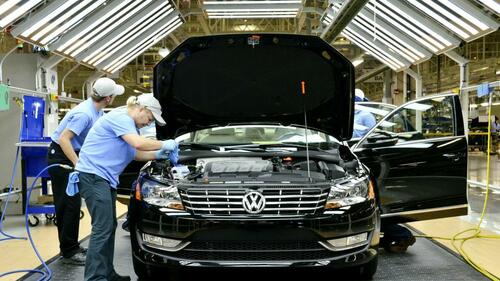
As discussed earlier today, Germany's economy is slowly but surely sinking, whether or not Mario Draghi's proposal to flood Europe in new debt is eventually accepted, and nowhere is the pain more tangible than Germany's iconic carmaker, Volkswagen, which we reported last week was considering its first-ever factory closure amid a dire economic backdrop, and which today took the shocking - for Germany - decision to end job protections for German auto workers as part of its cost-cutting push, setting up a calamitous showdown with unions as the country’s most important industry fights for its future.
This morning, the world's largest automaker by sales canceled several agreements linked to a three-decades-old pact that was supposed to safeguard employment until 2029, VW said. Guarantees will effectively run out by the middle of next year. According to Bloomberg, "ending job security commitments at a company synonymous with engineering prowess signals how far Europe’s biggest economy has fallen behind on competitiveness."
The moves are meant to “reduce costs in Germany to a competitive level,” VW’s human resources chief Gunnar Kilian said in a statement.
The news came shortly after BMW cut its profit expectations for the year after faulty brakes from German supplier Continental AG prompted a recall of 1.5 million vehicles. Last week, VW announced plans to potentially close factories in Germany for the first time after previous measures to cut expenses fell flat.
VW’s main target is its underperforming namesake passenger car brand, whose profit margins are getting squeezed amid a sputtering transition to EVs and a consumer spending slowdown. Carmakers in Europe are also struggling to compete with Tesla and new entrants from China led by BYDl, which have been selling cars at dumping prices, infuriating Brussels.
Cutbacks at VW are harder to push through than at other companies, especially since half the seats on the company’s supervisory board are held by labor representatives, and the German state of Lower Saxony — which owns a 20% stake — often sides with trade union bodies. The automaker, which employs almost 300,000 Germans, last week defended its plant closure plans, saying flagging car sales have left it with about two factories too many.
VW’s cost-cutting plans may result in unintended additional costs for the company of close to €1 billion ($1.1 billion), according to Thorsten Gröger, chief negotiator for the main IG Metall union: ending the guarantees trigger higher wages under previous collective bargaining pacts, he said in a separate statement.
While VW said it’s ready to start talks with labor representatives earlier than planned as part of the upcoming bargaining round, unions quickly vowed to fight the end of employment protections.
“We will put up a fierce resistance to this historic attack on our jobs,” said Daniela Cavallo, VW’s top employee representative and a supervisory board member. “With us, there will be no layoffs.”
Sorry, but there will be and by the time the layoffs are done, it will be a historic bloodbath.
As discussed earlier today, Germany’s economy is slowly but surely sinking, whether or not Mario Draghi’s proposal to flood Europe in new debt is eventually accepted, and nowhere is the pain more tangible than Germany’s iconic carmaker, Volkswagen, which we reported last week was considering its first-ever factory closure amid a dire economic backdrop, and which today took the shocking – for Germany – decision to end job protections for German auto workers as part of its cost-cutting push, setting up a calamitous showdown with unions as the country’s most important industry fights for its future.
This morning, the world’s largest automaker by sales canceled several agreements linked to a three-decades-old pact that was supposed to safeguard employment until 2029, VW said. Guarantees will effectively run out by the middle of next year. According to Bloomberg, “ending job security commitments at a company synonymous with engineering prowess signals how far Europe’s biggest economy has fallen behind on competitiveness.”
The moves are meant to “reduce costs in Germany to a competitive level,” VW’s human resources chief Gunnar Kilian said in a statement.
The news came shortly after BMW cut its profit expectations for the year after faulty brakes from German supplier Continental AG prompted a recall of 1.5 million vehicles. Last week, VW announced plans to potentially close factories in Germany for the first time after previous measures to cut expenses fell flat.
VW’s main target is its underperforming namesake passenger car brand, whose profit margins are getting squeezed amid a sputtering transition to EVs and a consumer spending slowdown. Carmakers in Europe are also struggling to compete with Tesla and new entrants from China led by BYDl, which have been selling cars at dumping prices, infuriating Brussels.
Cutbacks at VW are harder to push through than at other companies, especially since half the seats on the company’s supervisory board are held by labor representatives, and the German state of Lower Saxony — which owns a 20% stake — often sides with trade union bodies. The automaker, which employs almost 300,000 Germans, last week defended its plant closure plans, saying flagging car sales have left it with about two factories too many.
VW’s cost-cutting plans may result in unintended additional costs for the company of close to €1 billion ($1.1 billion), according to Thorsten Gröger, chief negotiator for the main IG Metall union: ending the guarantees trigger higher wages under previous collective bargaining pacts, he said in a separate statement.
While VW said it’s ready to start talks with labor representatives earlier than planned as part of the upcoming bargaining round, unions quickly vowed to fight the end of employment protections.
“We will put up a fierce resistance to this historic attack on our jobs,” said Daniela Cavallo, VW’s top employee representative and a supervisory board member. “With us, there will be no layoffs.”
Sorry, but there will be and by the time the layoffs are done, it will be a historic bloodbath.
Loading…





